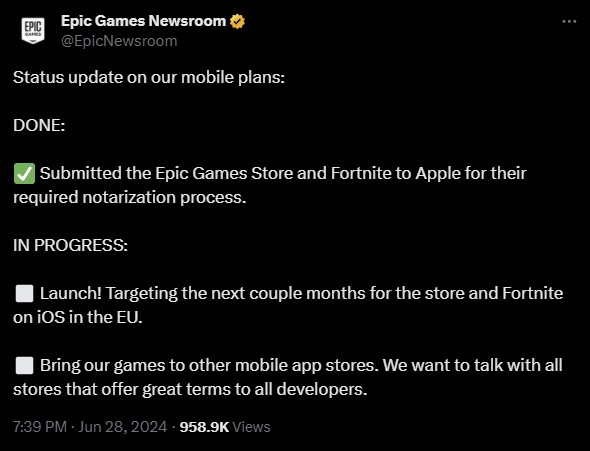Epic Games is gearing up for a significant reentry into the Apple ecosystem in the European Union, a move made possible by the recently implemented Digital Markets Act (DMA). This legislation, which aims to foster competition and provide more options for consumers, has compelled Apple to allow alternatives to its App Store, opening a door that Epic Games is eager to step through.
In August 2020, Fortnite, Epic Games’ wildly popular battle royale game, was removed from the App Store after Epic introduced a way for users to purchase in-game currency, V-Bucks, directly from Epic, bypassing Apple’s in-app purchase system. This move violated Apple’s guidelines, leading to Fortnite’s ban from iOS devices. The fallout included a legal battle and a strained relationship between the two companies.
However, the DMA has created a pathway for Epic Games to return to iOS devices in the EU. This new legislation mandates that major platform providers, like Apple, must allow third-party apps and app stores on their devices. Epic Games has submitted Fortnite and the Epic Games Store for Apple’s notarization, a necessary step before they can be launched on iOS in the EU.

Apple’s notarization process, which involves a human review, is known for being lengthy and somewhat opaque. Critics like Riley Testut, creator of the AltStore, have pointed out that the process can take months, adding to the frustration for developers. Epic is now navigating this process with hopes to launch within the next few months.
Once approved, apps must adhere to Apple’s fee structure, including a Core Technology Fee of 50 euro cents per install per year once downloads exceed one million units. This fee applies to both apps and app marketplaces. For Epic Games, this means they will be charged twice for each Fortnite download from their store—a policy they and other companies have criticized as still being non-compliant with the DMA’s spirit.
Epic Games isn’t stopping with the EU. The company has expressed interest in bringing its games to other mobile app stores, stating they are in discussions with various platforms that offer favorable terms for developers. This includes potential expansions into app stores run by companies like Amazon, Samsung, Huawei, and Xiaomi.
Interestingly, Epic has had a productive relationship with Microsoft, having previously partnered to bring Fortnite back to iOS and Android through Xbox Cloud Gaming. This collaboration highlights a more developer-friendly approach by Microsoft, which contrasts with Epic’s contentious history with Apple and Google.
While the EU’s DMA has paved the way for this reentry, other regions are also seeing shifts towards more open app markets. Epic plans to launch its Games Store in the UK and Japan next year, thanks to similar legislative efforts. However, the United States remains a significant holdout, with no current legislation forcing Apple to open its ecosystem.
Tim Sweeney, Epic Games’ CEO, has been vocal about the need for change in the US, likening the situation to being “locked behind Apple’s Iron Curtain.” The EU’s stance and actions provide a stark contrast and set a precedent that could inspire similar moves elsewhere.
The journey hasn’t been without its drama. Just as the DMA was about to take effect, Apple terminated Epic’s developer account, citing trust issues. This move sparked significant backlash, resulting in Apple reinstating Epic Games’ Sweden account after public and EU pressure. Despite these hurdles, Epic has reaffirmed its commitment to launching its Game Store and Fortnite in the EU by the end of 2024.

